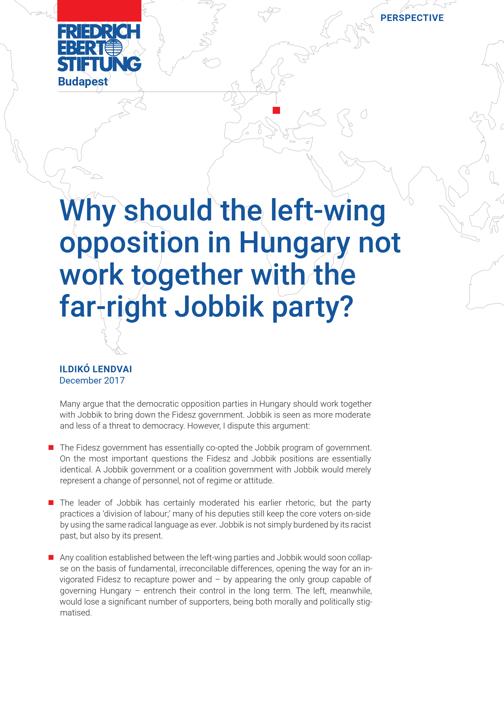Publikationen der StiftungWhy should the left-wing opposition in Hungary not work together with the far-right Jobbik party? Titel
Titelaufnahme
- TitelWhy should the left-wing opposition in Hungary not work together with the far-right Jobbik party?
- Verfasser
- Körperschaft
- Erschienen
- Umfang1 Online-Ressource (5 Seiten)
- SpracheEnglisch
- SeriePerspective
- DokumenttypDruckschrift
- Schlagwörter (LOCAL); ; ; ; ; ; ; ; ; ; ; ; ; ; ; ; ; ; ; ; ; ; ; ; ; ; ; ; ; ; ; ; ; ;
- Schlagwörter
- Geografika
- URN
- Das Dokument ist frei verfügbar
- Nachweis
- Archiv
Ildikó Lendvai, former President of the Hungarian Socialist Party (MSZP), reacts to political analyst Péter Krekó. He argued that the democratic opposition parties in Hungary should work together with Jobbik to bring down the Fidesz government. Jobbik is seen as more moderate and less of a threat to democracy. However, Ildikó Lendvai disputes his arguments: 1. The Fidesz government has essentially co-opted the Jobbik program of government. On the most important questions the Fidesz and Jobbik positions are essentially identical. A Jobbik government or a coalition government with Jobbik would merely represent a change of personnel, not of regime or attitude. 2. The leader of Jobbik has certainly moderated his earlier rhetoric, but the party practices a �division of labour;� many of his deputies still keep the core voters on-side by using the same radical language as ever. Jobbik is not simply burdened by its racist past, but also by its present. 3. Any coalition established between the left-wing parties and Jobbik would soon collapse on the basis of fundamental, irreconcilable differences, opening the way for an invigorated Fidesz to recapture power and � by appearing the only group capable of governing Hungary � entrench their control in the long term. The left, meanwhile, would lose a significant number of supporters, being both morally and politically stigmatised. Lendvai ends her article by admitting that it will be much harder to achieve a majority without Jobbik. However, she argues, there are times, when we must choose the harder road, for the seemingly easier one leads only to shame and failure. Furthermore, the harder road is not impassable.
